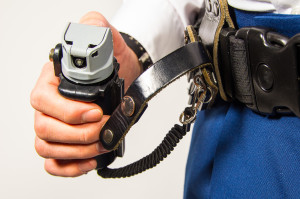Expert witnesses on police tactics and psychology took the stand last week in a lawsuit filed against Birmingham Police Officers for using pepper spray to subdue students in public high schools. The lawsuit has been filed on behalf of eight high school students who allege the local police were too quick to use pepper spray and caused them physical and psychological harm.
Birmingham High School Students File Pepper Spray Lawsuit
Leading the case against the Birmingham Police Department (BPD) are attorneys from the Southern Poverty Law Center (SPLC) who allege that that police officers stationed in Birmingham high schools used pepper spray on an estimated 200 students between 2006 and 2011. The lawsuit, originally filed on behalf of eight former students at a Birmingham high schools, has grown to a class action that is requesting monetary damages for six of the named plaintiffs and an injunction against the BPD forcing police to stop using pepper spray until better training is available. Ebony Howard, lead attorney for the SPLC claimed the lawsuit was filed because, “All Birmingham students have a fundamental right to attend school without the fear that they will be subjected to pepper spray on a whim.”
Birmingham’s Chief of Police has defended allegations in the lawsuit by testifying that students were not subject to pepper spray unless it was absolutely necessary to subdue them and prevent violent or disruptive behavior. Chief A.C. Roper argued that each of the named plaintiffs was engaged in violence and resisted police involvement before the use of mace. Further, attorneys for the BPD have noted that all officers are subject to rigorous training on the proper use of pepper spray and “has been accredited by the Commission on Accreditation for Law Enforcement Agencies.” Chief Roper also pointed out that police officers must not comply with use of force training requirements two times a year that teach responsible pepper spray use, but must defend every decision to administer the chemical spray on students.
In an effort to demonstrate that the BPD was overzealous in its use of mace on high school students, attorneys for the plaintiffs called expert witnesses to critique the appropriateness of pepper spray against students and to opine on the psychological effects mace has on children subject to it.
Expert Witnesses Used in Birmingham Pepper Spray Lawsuit
Earlier this week Daniel Coulombe, a former police chief who offers his services as an expert witness in law enforcement and police tactics, took the witness stand on behalf of the plaintiffs. Coulombe testified that, in his opinion and experience, pepper spray was not an appropriate use of force against high school students. Further, Coulombe claimed that when police use pepper spray in a high school environment, they are violating the student’s rights to an environment safe of excessive force. Coulombe went on to explain to jurors the proper procedures for neutralizing and restraining an unruly and potentially violent student that did not involve pepper spray.
Attorneys for the SPLC also called Dr. Daphne Glindmeyer to the stand as an expert in the psychological effects that the use of chemical spray has on students. Dr. Glindmeyer is a psychiatrist based in Louisiana who has experience working with victims of trauma, particularly from the use of pepper spray. During her expert testimony, Dr. Glindmeyer stated that the named plaintiffs in the lawsuit, one of whom was pregnant, all exhibited symptoms of trauma after being exposed to pepper spray at the hands of the BPD. Expanding beyond the name plaintiffs, Dr. Glindmeyer testified that many students in Birmingham schools who could be exposed to pepper spray, directly or indirectly, use ADHD medication and could suffer severe psychological or lasting physical harm.
Birmingham Police Attorneys Challenge Plaintiff’s Expert Witnesses
During cross examination of Coulombe, the defense challenged the police tactics expert for lack of experience in an environment as large or diverse as Birmingham. The BPD, which has nearly 800 officers, dwarfs Coulombe’s former department of 24 officers and is forced to deal with circumstances that the plaintiff’s law enforcement expert would not have sufficient experience with. Arguing that he could not provide adequate perspective on the appropriateness of the BPD’s use of pepper spray, attorneys for the department looked to downplay his contributions to the case.
Defense attorneys challenged the plaintiff’s psychologist expert on cross examination by pointing out that she did not speak to the students until nearly two years after police used pepper spray on them, and that none of the plaintiffs exhibited symptoms severe enough to indicate they suffered from PTSD. Defense attorney Elizabeth Shirley argued, “All they have are symptoms, according to this doctor, and those symptoms can come from any physical encounter: any fight, any kick, any punch, strike, any sort of physical integration with anyone in life.”
The trial, which is a bench-trial to be ruled upon by U.S. District Court Judge Abdul Kallon, is schedule to continue this week when the defense takes center stage.




